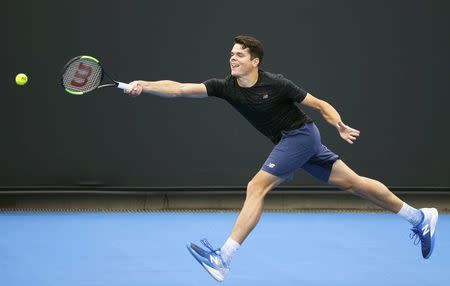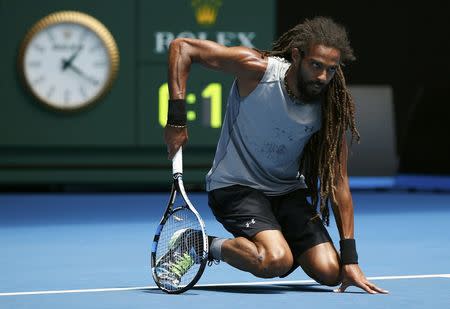Efficient Raonic dusts off Brown to advance
MELBOURNE (Reuters) - Milos Raonic was not going to be too effusive after his first round victory over Germany's Dustin Brown at the Australian Open on Tuesday because as far as he was concerned he did what he needed to do. The Canadian third seed wasted little time in dispatching the enigmatic dreadlocked German 6-3 6-4 6-2 in 93 minutes on Margaret Court Arena, with a powerful service game. Raonic, a semi-finalist at Melbourne Park last year, broke Brown once in each of the first two sets and then twice in the third. He also fired down 18 aces and another 20 unreturned serves. "It was what it needed to be," Raonic matter-of-factly told reporters of his performance. "It's obviously tough to have necessarily a solid performance all the way through, but I did what I needed to. "I took care of my serve. I broke quite early in all the sets. I returned pretty solid when I had to. I stepped up, and I played well." While he was prepared to at least acknowledge he had played well, Raonic's performance was something akin to an anaconda slowly squeezing the life out of its prey. The third seed just applied the pressure when he needed to against Brown, ensuring the 32-year-old had no options and that he was playing back to the Canadian's strengths. "I was much more solid on the return," added Raonic who faces Gilles Muller in the next round. "I was able to neutralise quite well ... (and) I felt like he was sort of playing with smaller and smaller margins." Why the performance pleased Raonic so much was because he felt it a continuation of the development of his game from the latter part of last year. While he always had a powerful serve, he was now aware of what he needed to do on the return, he said, realising that taking his time and hitting a good return puts pressure on his opponents more than defensively blocking one back and then scrambling to the opposite court. He had also been working with new coach Richard Krajicek to come forward more and block off the options in the open court especially against players like Andy Murray and Novak Djokovic, who are virtually impenetrable from the baseline. "I think I do things quite a bit better on both ends of the court," he said. "I think I'm taking care of both ends and just putting more pressure on." (Writing by Greg Stutchbury in Wellington; Editing by Peter Rutherford/Amlan Chakraborty)

 Yahoo Sports
Yahoo Sports 

